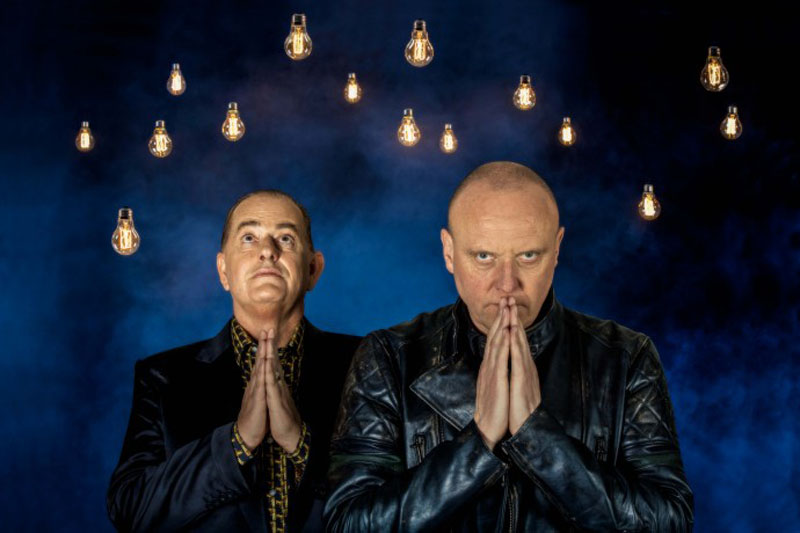Seminal novel by Anthony Burgess A Clockwork Orange has inspired a plethora of people over generations, turning to cog-like eye make-up and bowler hats for twisted logic of a dystopia. Concocted in the head of a fearful 55-year-old living in Brighton during the battle for sixties subculture supremacy, our protagonist (or antagonist if you’re that way inclined), following a spate of ‘ultraviolence’ with his ‘droogs,’ proclaims; “When a man cannot choose, he ceases to be a man.” Glenn Gregory and Martyn Ware have been fighting for this cause their entire career.
Selected by school-friends Martyn Ware and Ian Craig Marsh, following the unsuccessful release of The Human League’s 1979 album Travelogue, 22-year-old Gregory joined the fellow Sheffield pair to form Heaven Seventeen, named after a fictional band in the 1965-movie remake of the aforementioned book
“We wanted to be different, all the way back to Human League with no guitars, synthesisers and modern music. We’ve always been at the forefront of technology, whatever the latest innovation is, we’ve been at the front of it.”
Innovation should have been the band’s middle name. Pushing the boundaries, both musically, lyrically and thematically, Gregory, Ware and Marsh’s debut single was banned from Radio 1 by conservative Mike Read, long before his strange, faux Caribbean accent even became to take shape.
Back then, Read didn’t even begin to envisage the success that Gregory and Heaven Seventeen would have.
“We always felt like we were looking towards the future with the band and leading from the front, rather than shouting from the back.
“Toeing our own line, rather than one set by somebody else, was vital to us. I think that’s why Martin set up British Electronic Foundation (B.E.F).
“They wanted a new way, a more modern way. Martyn and Ian were tired of what they deemed the old fashioned way in which Human League and many of their contemporaries were working by making an album, touring it, then making another and touring it. It became very one dimensional for them.”
But nobody could call the freshly christened B.E.F one dimensional, boring or stunted. Ware and Smith signed to Virgin as a rarely seen ‘label within a label.’ Their opening contract stipulated that they had the right to produce up to six albums a year.
The British Electronic Foundation was really something different that would smash the norm, like a pyjama clad ruffian robbing a sex-obsessed art collecting woman.
“That’s always the thing about B.E.F. that we wanted to be a little bit strange. We formed an album of unlikely collaborations and you really wouldn’t know what to expect. Something you probably don’t get today.“It was always about incongruous artists playing incongruous songs that you wouldn’t think they would do.”
The debut album Music for Stowaways was certainly brave from the Northern pair, reworking treasured hits into sonically pleasing electro-pop. Manfred Mann’s Paul Jones covered R. Dean Taylor’s There’s a Ghost in my House, Sandie Shaw covered Scouse sweetheart Cilla Black and Tina Turner turned the Temptations into a synthesiser heavy psychedelic smash hit.
It set the wheels in motion for the Nutbush City songstress’ massive return and helped Turner reclaim her crown as Queen of Pop.
“You say the name Tina Turner and people are almost shocked that people like us worked with a mega star like her. I mean it’s bloody Tina Turner!
“But back then, she was only playing small Vegas joints and wasn’t really doing a lot. “We just knew she’d got that voice. That voice from heaven, truly unbelievable.“Martyn and I absolutely adored it. River Deep, Mountain High was certainly a favourite of ours.”
British Electric Foundation was never going to be in-the-box or out-of-the-box. Like a well-oiled football team, Ware and Gregory selected musicians on their individual talents, not their pulling power or commercial success.
“That first album was eclectic. “The first BEF album, Music of Quality and Distinction: Volume One, had Paula Yates, Sandie Shaw and Bernie Nolan.”
Bernie Nolan’s cover of The Supremes smash-hit You Keep Me Hangin’ On was a brave statement by Ware and Gregory, but they believed in the artists they worked with, the technology they were pioneering and the quality of the sounds created during that period. “Bernie Nolan was nowhere near cool.
“We just knew she had a good voice and went for it.”
The disco toe-tapper represented a change to the tactics of the record industry. Ware and Gregory both knew it. But, like the Beatles in 1966, they kept the innovation under the cover of darkness and out of the public until 2007. “B.E.F. is not, and never has been, about getting artists that pulls in the crowds and sell tickets. It’s about trying to find something different and a little bit new but definitely unexpected!”
On the eve of what Gregory has christens “a small, celebratory tour,” the 58-year-old admits he celebrated his admittance into B.E.F like “getting the golden key to the executive toilet” after years of invitations from his long-time band mate. “I can promise you that wasn’t a back handed compliment! “I feel like I’ve been promoted though and it’s a real honour to be more involved, despite my reluctance previously”
That reluctance had certainly never shown through Gregory’s involvement with Heaven Seventeen and many other projects.“I’m currently writing and composing for a Chinese Orchestra.“It’s amazing to keep so busy with a whole selection of different projects.”
Those varied and almost random projects kept Ware and Gregory away from the studio for prolonged periods since their 2008 album Naked as Advertised, but it seems to be the eclectic that magnetises the Sheffield pair back together again.“It takes us a long time but Martyn and I are in the studio, and we’re writing an album in a slightly different way.“We’re releasing two 12” inch vinyls, both double A sides each around 6 months apart.
“They’ll only be available on wax. We’re just trying to make a difference and push boundaries, even at our age. “We don’t get it right 100% of the time. But it keeps it interesting for us. “
And interesting it certainly has been, since the word go. A trio of top twenty albums and a triplet of top ten singles certainly makes three the magic number for the trio. But why, four weeks before the 35th anniversary of the bands eponymous debut Penthouse and Pavements have Ware and Gregory decided to revisit the gold-selling record to add a more electronic flair?
“The time just felt right I guess.“When we wrote those songs, we were a studio band. We didn’t play live and consequently, I probably sang them twice in front of a microphone and that was it, bang, cut the album.
“But as we’ve played these songs over the years, you do start to get bored of them. Not of the songs themselves but of the repetitive nature of playing exactly the same version. “It’s very gentle and organic and you don’t overthrow the whole sound of the song. You are still getting the same songs, they’re just evolved, grown-up versions. They are looked at, studied and altered- but only slightly.”Gregory, ever the frontman, certainly wasn’t one to mince his words in the eighties and has carried that eighties boldness into his 58th year. “If I had to describe them in one word, it’d be this – brilliant!”
Culture has definitely come full circle and returned to take the UK back to an era of forward-thinking music, political division and ghost-busting movies.
ABC’s sequel to Lexicon of Love, Rick Astley’s birthday-celebrating album, Paul Simon’s Stranger to Stranger and Pet Shop Boys Super all entered the top five on their opening week, while the Never Going to Give You Up singer and the man you can call ‘Al’ topped the Album Charts above the likes of Drake, Tom Odell and Catfish and the Bottlemen.“I think the decade has lasted thirty odd years in my opinion, it’s never really gone away. “It seemed to get slated and is always labelled as the most cringey, with shoulder pads and high-waisted trousers but it was done a disservice by the fashion.
“The music is not about that and should be judged separately to it. “I honestly think it was one of the greatest decades of song writing, originality and great songs. “However, it did wane slightly in the nineties.”
This comparison maps identically on the lifespan of Heaven Seventeen. Gregory admits that he was unsure which direction the band were heading in the mid-nineties and needed a break to truly understand what the lead singer and his counterpart, Ware were trying to achieve.
However, the love they share for each other, for musical experimentation and for the technology they’ve helped pioneer has never waned. “Martyn produced ‘I Say, I Say, I Say’ for Erasure and Andy [Bell] asked if we would tour them to promote that record.“Martyn was wary and said we weren’t doing much at the moment. But the wind must have been blowing the right direction or the stars aligned, cos we all thought ‘yeah, we’ll have a crack at that’ and we haven’t really looked back. “The fire has been burning madly since then. Me and Martyn are firing on all cylinders.”
Gregory and Martyn bring Heaven Seventeen and B.E.F to Birmingham and out across the UK for the second time in November.
But could fans be waving goodbye to Gregory and Martyn when the curtain comes down on Penthouse and Pavements and the second-coming of B.E.F in November?
“Definitely not! “People seem incredibly interested to see what we’re doing and how we’re achieving, but artists seem incredibly interested to be involved with it, like Glen [Matlock, Sex Pistols] and Mari Wilson who’ll be joining us on this tour.”“B.E.F have only just begun”
A new dawn for electric music, but something new, exciting and varied for Gregory to sink his teeth straight into whilst the expertly crafted Heaven Seventeen continued to spread enjoyment worldwide.
If B.E.F are just beginning, who does Gregory and the newly invigorated, fresh-faced band look to partner with as it begins on its next whirlwind adventure, after recent performances alongside the likes of Peter Hook, La Roux and Thomas Dolby? “I genuinely don’t know where we’ll head next.
“It’s just finding that connection and making people think ‘They shouldn’t do that, but it works.”
“It’s a really exciting time. Who knows what the future holds?” It’s now all down to Ware and Gregory to plot out the next unexpected stage of their career. One thing is definitely guaranteed. It’ll be unexpected, it’ll be shocking, just like the novel from which their band was named.
It’s exciting.
Dan Shorthouse







